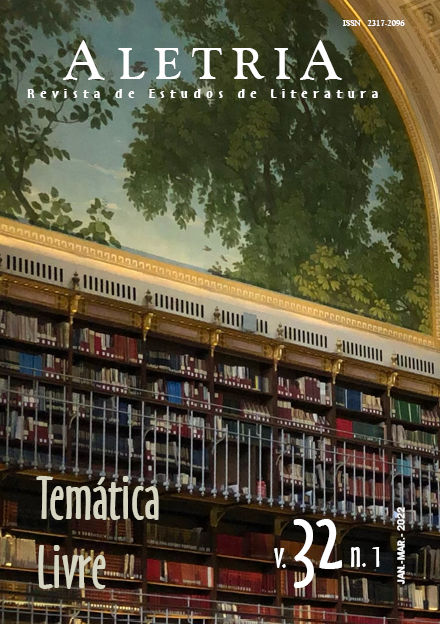Of human condition
the theme in archaic Greek poetry
DOI:
https://doi.org/10.35699/2317-2096.2022.34239Keywords:
archaic Greek poetry, Bacchylides, pessimism, humanity, melicAbstract
The article discusses the archaic Greek view of men and human condition, through which we learn of the traditional poetic pessimism that considers the fragility, the limitation and the finitude of human nature in a courageous and no-illusions manner. A nature that by its intrinsic qualities distinguishes itself from that of the gods to whom it is the necessary referent for their hierarchic cosmic superiority. By doing so, it moves through Homer, Hesiod and Simonides, but focuses on Bacchylides’ epinician melic poetry, specifically, Epinician 5, in order to highlight the themes that therein are as important as that of praise for the athletic victory: the theme of human condition and the instability of fortune and limitation of knowledge.
Downloads
References
ALLEN, Thomas W. (ed.). Homeri Opera: Odysseae I-XII. 2. ed. Oxford: Clarendon, 1975a. t. III.
ALLEN, Thomas W. (ed.). Homeri Opera: Odysseae XIII-XXIV. 2. ed. Oxford: Clarendon, 1975b. t. IV.
BREMMER, Jan. The Early Greek Concept of the Soul. Princeton: University Press, 1983. DOI: https://doi.org/10.1515/9780691219356.
CAIRNS, Douglas L. (introd., ed., coment.). Bacchylides: Five Epinician Odes (3, 5, 9, 11, 13). Cambridge: Francis Cairns, 2010.
CHANTRAINE, Pierre. Dictionnaire Étymologique de la Langue Grecque. Paris: Klincksieck, 1999.
CLAY, Jenny S. Hesiod’s Cosmos. Cambridge: University Press, 2003.
DICKIE, Matthew W. On the Meaning of Ἐφήμερος. Illinois Classical Studies, [s. l.], v. 1, p. 7-14, 1976.
FEARN, David. Bacchylidean Myths. In: AGÓCS, Peter et al. (ed.). Reading the Victory Ode. Cambridge: University Press, 2012. p. 321-343. DOI: https://doi.org/10.1017/CBO9781139017626.021.
FRAENKEL, Eduard. (ed., coment.). Aeschylus. Agamemnon. Oxford: Clarendon Press, 1982. v. II: Commentary on 1-1055.
FRÄNKEL, Hermann. Man’s “Ephemeros” Nature According to Pindar and Others. Transactions of the American Philological Association, [s. l.], v. 77, p. 131-145, 1946. DOI: https://doi.org/10.2307/283450.
HARVEY, Anthony. E. Homeric Epithets in Greek Lyric Poetry. Classical Quarterly, Cambridge (UK), v. 7, n. 3/4, p. 206-223, jul./out. 1957. DOI: https://doi.org/10.1017/S0009838800015287.
HERINGTON, John. Poetry into Drama: Early Tragedy and the Greek Poetic Tradition. Berkeley: University of California Press, 1985.
HESÍODO. Trabalhos e dias. Tradução de Christian Werner. São Paulo: Hedra, 2013.
HOMERO. Ilíada. Tradução de Christian Werner. São Paulo: Sesi: Ubu Editora, 2018a.
HOMERO. Odisseia. Tradução de Christian Werner. São Paulo: Sesi: Ubu Editora, 2018b.
LEFKOWITZ, Mary R. Bacchylides’ Ode 5: Imitation and Originality. Harvard Studies in Classical Philology, Cambridge (M), v. 73, p. 45-96, 1969. DOI: https://doi.org/10.2307/311148.
LEFKOWITZ, Mary R. The Victory Ode: an Introduction. New Jersey: Noyes, 1976.
LESHER, James H. Archaic Knowledge. In: WIANS, William. (ed.). Logos and Muthos: Philosophical Essays in Greek Literature. New York: Sunny Press, 2009. p. 13-28.
LESHER, James H. Early Interest in Knowledge. In: LONG, Anthony A. (ed.). The Cambridge Companion to Early Greek Philosophy. Cambridge: University Press, 1999. p. 225-249. DOI: https://doi.org/10.1017/CCOL0521441226.011.
MACLACHLAN, Bonnie. The Age of Grace: Charis in Early Greek poetry. Princeton: University Press, 1993. DOI: https://doi.org/10.1515/9781400863358.
MAEHLER, Herwig. (ed.). Bacchylides. Carmina cum Fragmentis. 11. ed. Munich, Leipzig: K. G. Saur, 2003. DOI: https://doi.org/10.1515/9783110977332.
MAEHLER, Herwig. (ed., coment.). Bacchylides. A Selection. Cambridge (UK): University Press, 2004. DOI: https://doi.org/10.1017/CBO9780511802386.
MONRO, David B.; ALLEN, Thomas W. (ed.). Homeri Opera: Iliadis Libros XIII-XXIV. 3. ed. Oxford: Clarendon, 1920. t. II.
MUGLER, Charles. La Lumière et la Vision dans la Poésie Grecque. Revue des Études Grecques, Paris, v. 73, n. 344/346, p. 40-72, jan./jul. 1960. DOI: https://doi.org/10.3406/reg.1960.3598.
PAGE, Denys L. (ed.). Poetae Melici Graeci. Oxford: Clarendon, 1962.
RAGUSA, Giuliana. (org., trad.). Lira Grega. Antologia de Poesia Arcaica. São Paulo: Hedra, 2013.
RAGUSA, Giuliana. De Brotos, Vergônteas e que tais: a Imagem de Meleagro no Epinício 5, de Baquílides. Revista Organon, Porto Alegre, v. 31, n. 60, p. 63-83, jan./jun. 2016. DOI: https://doi.org/10.22456/2238-8915.62486.
SULLIVAN, Shirley D. The Wider Meaning of Psyche in Pindar and Bacchylides. Studi Italiani di Filologia Classica, Florença, v. 9, n. 2, p. 163-183, 1991.
WEST, Martin L. (ed., coment.). Hesiod, Works and Days. Oxford: Clarendon, 1982.
WIANS, William. The Agamemnon and Human Knowledge. In: WIANS, William. (ed.). Logos and Muthos: Philosophical Essays in Greek Literature. New York: Sunny Press, 2009. p. 181-198.
Downloads
Published
How to Cite
Issue
Section
License
Copyright (c) 2022 Giuliana Ragusa (Autor)

This work is licensed under a Creative Commons Attribution 4.0 International License.
Authors who publish with this journal agree to the following terms:Authors retain copyright and grant the journal right of first publication with the work simultaneously licensed under a Creative Commons Attribution Non-Commercial No Derivatives License that allows others to share the work with an acknowledgement of the work's authorship and initial publication in this journal.Authors are able to enter into separate, additional contractual arrangements for the non-exclusive distribution of the journal's published version of the work (e.g., post it to an institutional repository or publish it in a book), with an acknowledgement of its initial publication in this journal.Authors are permitted and encouraged to post their work online (e.g., in institutional repositories or on their website) prior to and during the submission process, as it can lead to productive exchanges, as well as earlier and greater citation of published work (See The Effect of Open Access).





